It's true, there are all sorts of different types of disability, which can mean different challenges for different people, but on this page we've spoken to several people who have first hand experience of facing up to, challenging, and overcoming problems and difficulties that might have stopped them dead. We hope their inside track on what disability means for hill-goers and climbers will help inspire and advise.
Jamie Andrew’s life changed in 1999, when his hands and feet were amputated due to frostbite sustained on a mountain in the French Alps.
He said: “As an extremely active outdoor person I was very keen to get back into the mountains that I loved so much. In fact many of the skills I had learned through my years of mountaineering proved fundamental in my journey of rehabilitation. Determination, positivity, resilience, resourcefulness and patience are all attributes that are both necessary and learned in the outdoors. I pretty quickly discovered that I only had to turn these skills to the new challenge that I faced in order to enjoy the mountains once more and soon I began to exceed my own expectations as well as the ones of those around me.
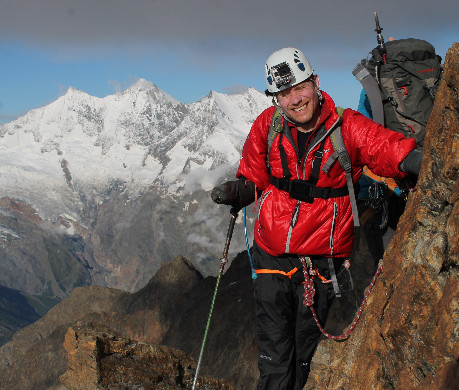
Jamie Andrew climbing in the Alps.
“As I made that journey from hospital bed to mountain summit, certain key principles of approach became apparent:
“Begin with a positive attitude. It may seem clichéd or trite, but it really is true that if you can begin an endeavour with the belief that it is possible, then the chances of success are infinitely higher than if you start out assuming you’ll fail. Talk yourself up for it!
“Keep it simple. I’ve wasted so many hours of my time trying to design specialised prosthetic climbing arms, or skiing legs, only to discover that when I finally gave these things a go, I could actually manage fine without. In fact it’s amazing how often even the greatest problem can turn out to have the simplest solution, and even more amazing how often that solution can be right in front of your nose.
“Ask for help. OK so I’m proud. I’m stubborn and I like to be independent. But the outdoors is an environment where humans need to rely on one another. So I value my own self-reliance, but I’m not afraid to ask for help when I need it, or even when it just makes things quicker and easier. Mate, can you do up my zip? Untie my knot?
“Start low, aim high. It’s important to have lofty ambitions – we all know that. But it’s equally important to have small goals, readily achieved, and mid-level targets to draw us on. It is only in working away, step by step, goal by goal, that we can have even a chance of realising those distant dreams.
“Enjoy the trip. Life is a journey, not a destination. That journey is different for each of us, so it doesn’t matter if you’re struggling up Diffs or crushing 8cs, if you’re cruising the Cuillin Ridge or pushing your chair round an accessible path, the very fact that you’re getting out and enjoying the outdoors makes you a winner!”
Read Life and Limb: A True Story of Tragedy and Survival, by Jamie Andrew, sometimes harrowing reading but hugely inspiring.
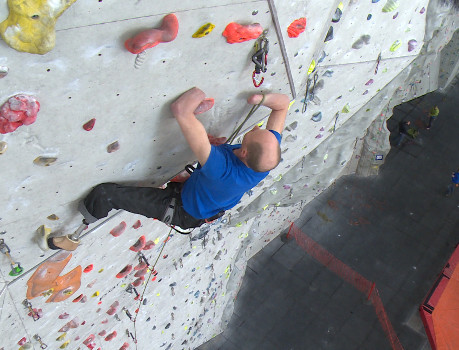
Jamie climbing at EICA Ratho
Andy was diagnosed with multiple sclerosis 10 years ago, around the same time he set up his mountain bike adventure tours company Go-Where. Though he has the support of his wife Aneela and his colleagues in the company, he is still a very active mountain biker and tries to get out every day.
He said: “Even though my physical ability is impaired, the desire to get out there is just as strong – if not stronger. Activity, diet and lifestyle are the key, and for me continuing to be active and get in among the hills is the best. To me there’s nothing more levelling than getting into the hills and getting into a bothy or camping, or getting the bike into mountain spaces. These things have permanence and scale and put a lot of my difficulties into perspective and make them more manageable when I am back home.”
“The benefits I get from going into the mountains are undeniable. Through the support of friends or family, and even though you may have to scale down your horizons, it’s absolutely crucial. Activity, diet and maintaining your lifestyle is key. Sometimes drugs are essential, but a lot of research is looking towards diet and exercise – and not just for MS.”
Andy has set up a Facebook group for fellow MS sufferers, @Stoked on MS. It’s a closed group, but welcomes new members. He also features in an inspiring film, ‘This Way Up’ which portrays his passion for the hills and mountain biking and his pharma-free fight with MS. It is being shown at events across the country to raise awareness and funds for two MS charities, the Swank MS Foundation, and Overcoming MS. Anyone who has a suitable event can contact Andy at stokedonms@gmail.com to arrange a showing, or view Andy's website for details.
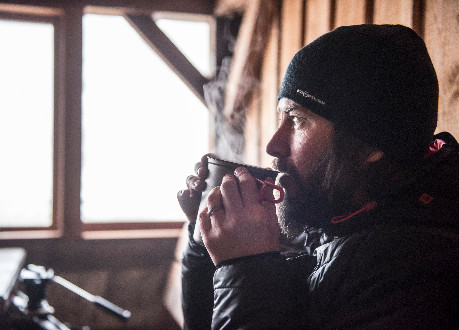
Andy McKenna.
Gillian broke her back in February 2008, but was determined to get back in the great outdoors despite the obstacles of initial short-term paralysis, numerous spinal surgeries, pain relief injections, and having to adapt to what she calls her ‘new normal’.
“The day of my accident saw my life immediately change, becoming focused on regaining mobility from initially having paralysis then learning to manage chronic pain, ongoing complications with my back recovery, numerous surgeries and other procedures. Despite this, one thing was clear – I was determined to get back enjoying the great outdoors.
“Being outdoors brings peace, contentment and such joy – so much so it’s hard to put into words. It took six years before I was able to get back hillwalking, but I’ve not looked back. Instead, I have been determined to build strength, research what I could do to help my progress, and grab every opportunity to explore and immerse myself in the beauty of mountains and countryside.
“I can’t weight-bear, therefore I can’t take a rucksack on my back. This isn’t an issue for shorter and lower level walks, but day or multi-day treks is an issue. Thankfully, I have great friends who are more than happy to share my load of clothing and food between them. However, I have tried joining other groups when my friends haven’t been available, to be faced with a more closed mindset where I am perhaps seen as a risk or inconvenience, instead of a keen hillwalker who just needs a bit of help with carrying water and food. Such attitudes must change and instead be more about inclusion and adaption with the willingness to understand our capabilities.
“Following the latest spinal surgeries in 2014 where my back was stabilised to an extent to allow far better movement, I have grabbed life and the opportunity to venture into the outdoor life, the dream I kept alive since Feb 2008. As well as lots of many great hillwalking and sporting times in Scotland, I also ventured overseas as I set myself further personal challenges, which have included climbing Kilimanjaro and Toubkal, trekking in Albania into Montenegro, kayaking around Croatia’s islands and abseiling off Table Mountain. Such challenges were made possible due to tour ground handlers understanding my capabilities and carrying limitations, and my passion for being outdoors.
“Of course you don’t have set such big challenges. But I do suggest you set small goals, realise you’re not alone in your journey and, above all, keep your dreams alive. All you have to do is take baby steps forward, but over time you will see huge progress.
“I set up the charity BackStrong Trust to ensure those with spinal injuries and conditions do not give up hope, but instead see there is an array of information and support available, and a community that cares.”
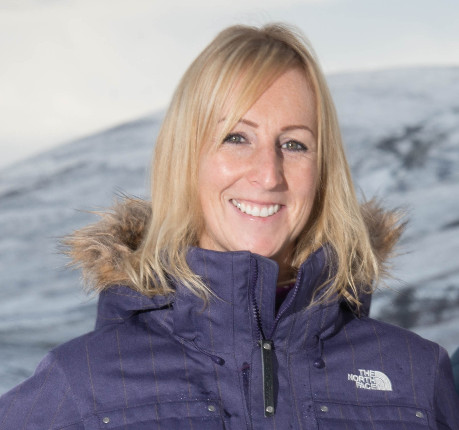
Gillian Fowler.
Garry Cormack is a mountain leader who has worked with BackStrong in the past and runs his own business taking people on guided walks in the mountains – yet he too suffered a spell of disability.
“I had lower disc replacement in my back a few years ago and have since changed career, setting up Hillgoers and doing something I love, getting out in the hills and glens. I don’t advertise anything specifically on my site, but I have helped people build their confidence to get out after injury – physical and mental.
“Using my experience of what I have gone through I would certainly talk to anyone who wanted to go into the hills. For all my walks I have a participation form, with details for medical form and previous experience. If anyone has any major difficulty it would just be a case of picking up the phone and talking to me about it. Break it into little chunks: rather than aim for the top of Lochnagar, go to Loch Muick and see how things are; go on to Glas Allt Sheil, try as far as the waterfall – and if time is pressing we go back. If it’s a single person with a disability I would reduce my ratio and do a one-to-one guided walk. You just have to take it as it comes. There’s never any rush to get up the hill.
“When I had my back problems through my 30s I started building it up slowly until I did the TGO Challenge across Scotland, carrying my own rucksack, and then went on to get my ML qualifications. If you’d told me six or seven years ago I’d be doing this I’d just have laughed.
“For me what kept me going was that I just needed to get back outside again. I was getting a freedom I’d not had for a while.
“As well as getting fitter, I’ve developed a much greater interest in the flora and fauna around me, and in the human history of the hills. It’s fascinating, and offers another way to enjoy being in the mountains other than just concentrating on the tops.
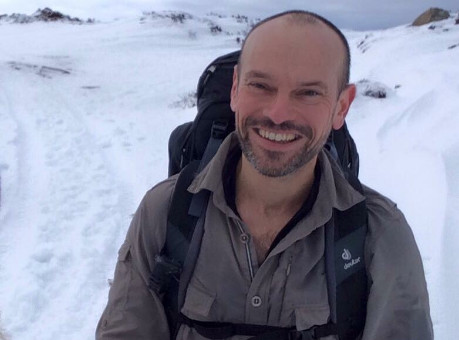
Garry Cormack.